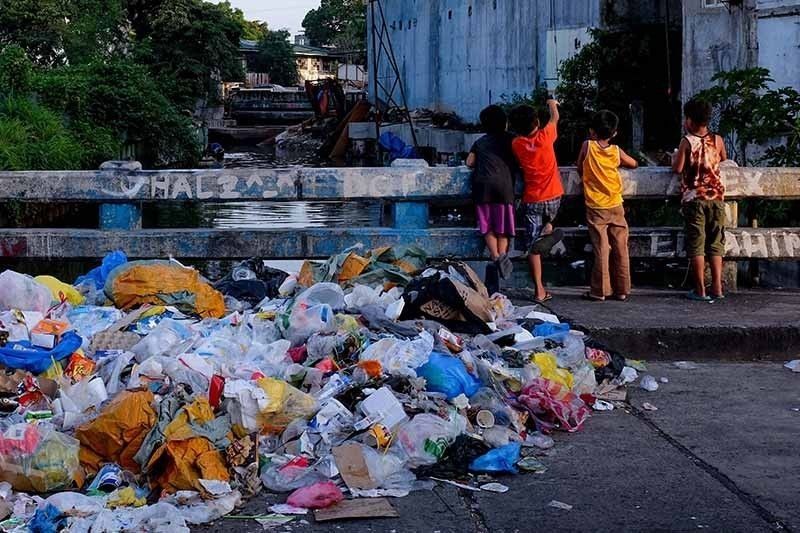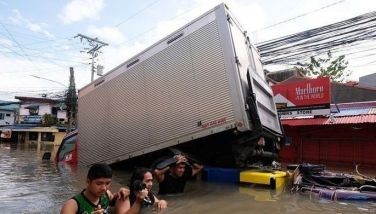Marcos urged to veto extended producer responsibility bill

MANILA, Philippines — Environmental groups called on President Ferdinand Marcos Jr. to veto the proposed legislation on extended producer responsibility (EPR) in waste management, saying it will not fully address the plastic pollution problem in the Philippines.
In a briefing Thursday, groups calling for a plastic-free Philippines warned the bill, which is set to lapse into law this July, fails to control plastic pollution and promotes false solutions such as incineration.
“Actually, it’s a very welcoming approach from our legislators that they finally acknowledge the role of the producers and companies. But the version of this EPR is not really consistent with the principles of EPR, which is to make polluters pay,” said Coleen Salamat, plastic solutions campaigner of EcoWaste Coalition.
EPR, as defined by the Organisation for Economic Co-operation and Development, is a policy approach in which producers are given a significant responsibility for the treatment or disposal of post-consumer products. But EPR, according to global movement Break Free From Plastic, is a policy principle that extends the responsibility of producers over the entire life cycle of items.
Groups stressed that the proposed EPR scheme is limited to downstream interventions such as recovery and offsetting, and encourages thermal treatments such as incineration and pyrolysis or the process of chemically decomposing materials at elevated temperatures without oxygen.
The proposed law mandates large enterprises to establish EPR programs for the plastic packaging of their products. It sets targets for recovery of plastic product footprint generation: 20% for end-2023, 40% for 2024, 50% for 2025, 60% for 2026, 70% for 2027, and 80% for 2028, and every year thereafter.
Obliged enterprises that fail to comply with the measure can be fined at most P20 million and a suspension of business permit until the law’s requirement is met.
“When the very companies who are supposed to be the target of this law are the ones calling for its passage, and civil society organizations are the ones calling for a pause, I think it will give everyone a reason to doubt whether the EPR bill that is currently being considered is really meant to address the problems of plastic pollution or is it meant to provide businesses a way to continue with business as usual,” said Froilan Gaite, executive director of the Global Alliance for Incinerator Alternatives Asia Pacific.
Contribution to climate crisis
Greenpeace zero waste campaigner Marian Ledesma pointed out that plastic production and thermal treatment are major contributors to greenhouse gas emissions. Plastics generate planet-warming gases at every phase of their life cycle.
“The president must veto this bill because it can affect the government’s climate goals and worsen the situation of affected communities in the Philippines,” Ledesma said.
“If the government is really serious in its climate commitments and its aim to protect Filipinos, the EPR bill should be first vetoed and then be revisited in the 19th Congress to fix the issues that have been identified,” she added.
Dr. Glenn Roy Paraso, executive director of Mary Johnston Hospital in Tondo, Manila, also said that waste burning poses hazardous impacts on human health. For example, waste incinerators produce pollutants such as mercury emissions, and dioxins and furans that contaminate soil, air, and water sources.
BFFP project coordinator for corporate accountability Miko Aliño recommended that a strong EPR scheme should have the following:
- Timebound targets for adopting reuse or adopting refill and recycled content
- Eco-modulation of EPR fees anchored on waste hierarchy that prioritizes waste prevention
- Inclusion of informal waste sector
- Increased transparency and accountability
- Wider policy approach focusing on waste prevention and sustainable product design
“EPR is not a silver bullet so it should be supplemented by other measures,” Aliño said.
In his inaugural speech, Marcos stressed that the Philippines has to play its part in addressing plastic pollution. How he plans to do that remains unclear. — with report from BusinessWorld/Alyssa Nicole O. Tan
- Latest



























